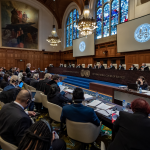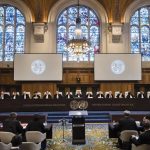
The Government of Guyana has approached the International Court of Justice in an effort to block a number of questions in Venezuela’s upcoming referendum on the border controversy, that seeks to solidify the country’s claim to Guyana’s Essequibo region and make the Essequibo a new Venezuelan state.
Guyana currently has Venezuela before the International Court seeking a final juridical settlement of the border controversy.
In a statement today, the International Court has indicated that Guyana has filed a request for provisional measures in the Arbitral Award case.
In the request to the International Court, Guyana noted that the purpose of the Venezuelan referendum is “to obtain responses that would support Venezuela’s decision to abandon [the current proceedings before the Court], and to resort instead to unilateral measures to ‘resolve’ the controversy with Guyana by formally annexing and integrating into Venezuela all of the territory at issue in these proceedings, which comprises more than two-thirds of Guyana”.
Guyana wants the International Court to order that Venezuela not proceed with the Consultative Referendum planned for 3rd December 2023 in its present form.
Additionally, Guyana wants Referendum to not include three questions that refer to making Essequibo a new state of Venezuela.
Guyana also wants the International Court to order that Venezuela not include within the ‘Consultative Referendum’ planned, or any other public referendum, any question encroaching upon the legal issues to be determined by the International Court in its Judgment on the Merits, including (but not limited
to) the legal validity and binding effect of the 1899 Award; sovereignty over the territory between the Essequibo River, and the boundary established by the 1899 Award and the 1905 Agreement; and the purported creation of the State of ‘Guayana Esequiba’ and any associated measures, including the granting of Venezuelan citizenship and national identity cards.
The International Court of Justice is also being asked to make provisions that Venezuela shall not take any actions that are intended to prepare or allow the exercise of sovereignty or de facto control over any territory that was awarded to British Guiana in the 1899 Arbitral Award, and that Venezuela shall refrain from any action which might aggravate or extend the dispute before the Court or make it more difficult to resolve.
At the earlier start of the main proceedings before the International Court, Venezuela questioned the Court’s jurisdiction to hear and determine the border matter. The Court dismissed Venezuela’s objection and has moved ahead with the case.
In a statement today, the Government of Guyana said it has no doubt of the validity of that Arbitral Award and the land boundary, which Venezuela accepted and recognized as the international boundary for more than 60 years.
The Government said because of the urgency of the matter related to the planned Venezuelan referendum, Guyana has asked the Court to schedule oral hearings on its request at the earliest possible date in advance of December 3, 2023, which is the date that Venezuela has fixed for its “sham referendum”.
“Guyana insists, as does CARICOM, the Secretary-Generals of the United Nations and Organization of American States, and the entire international community, that the controversy over the validity of the Arbitral Award and the land boundary must be resolved by the International Court of Justice, which will assure a just, peaceful, binding and permanent solution to this matter, in accordance with international law. In fact, the Court itself has determined, in two separate Orders, that it has the exclusive jurisdiction to resolve this matter, and that it will do so. Twice Venezuela has formally objected to the Court’s jurisdiction, and both times the Court overwhelmingly rejected Venezuela’s objections”, the statement said.
In the interim, and pending the oral hearing on its request and the issuance of the Court’s Order, Guyana urges CARICOM and the international community to continue reminding Venezuela of its obligations under international law, including its obligation to accept the ICJ’s jurisdiction, plead its case to the Court, and comply with the Court’s rulings and Judgments.
In the past few weeks, Venezuela has been stepping up its claim of Guyana’s Essequibo region with the National Assembly agreeing to move ahead with a referendum on the controversy.
President Irfaan Ali has made it clear that Guyana will remain with the case before the International Court and will not give up an inch of Guyana’s territory.



















You must be logged in to post a comment Login